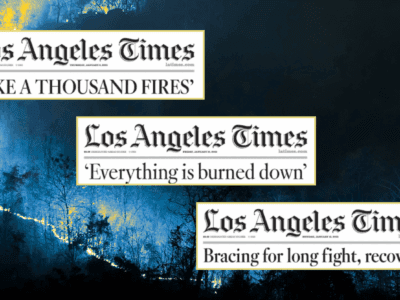Wow, things really have changed in Washington: a Cabinet official speaks about climate change’s impacts on California
The Los Angeles Times has a story today in its (venerable but soon-to-be-axed) California section discussing new Energy Secretary Steven Chu’s public statements on the dramatic challenges California will face as a result of climate change. From the story:
Chu warned of water shortages plaguing the West and Upper Midwest and particularly dire consequences for California, his home state, the nation’s leading agricultural producer.
In a worst case, Chu said, up to 90% of the Sierra snowpack could disappear, all but eliminating a natural storage system for water vital to agriculture.
“I don’t think the American public has gripped in its gut what could happen,” he said. “We’re looking at a scenario where there’s no more agriculture in California.” And, he added, “I don’t actually see how they can keep their cities going” either.
None of this is news to those of us who have been following the issue (see this recent state-commissioned report for one recent analysis). Nonetheless, Dr. Chu’s remarks bode well for the new administration’s awareness of the urgency of addressing climate change as well as the new administration’s commitment to incorporating science into its decisionmaking.
UPDATE: Jonathan Adler and Roger Pielke Jr. have criticized Dr. Chu’s quoted remarks, on the Volokh Conspiracy and Prometheus blogs, respectively. I have posted a comment on this thread responding to Jonathan’s criticisms.
Reader Comments
4 Replies to “Wow, things really have changed in Washington: a Cabinet official speaks about climate change’s impacts on California”
Comments are closed.






Sean —
I understand why you would be pleased that Secretary Chu is concerned about the potential effects of climate change. But after 8 years of an alleged “war on science” by Republicans, should we not be concerned about ridiculous scientific statements like those you quote above? Chu’s statement that “We’re looking at a scenario where there’s no more agriculture in California,” is absurd. The California impact study you cite says nothing of the kind, nor do other studies make such extreme predictions (nor are there serious studies supporting the claim that California cities would disappear either). If the Bush Administration was wrong to distort science to downplay the risks posed by climate change, should not we also care about Obama Administration officials distorting science to exaggerate the risks? Or is it okay if it supports policies that like?
JHA
Jonathan,
You make a fair point. The answer to your final question is no, I think it would be a mistake for federal officials to distort science for any ends. But I actually interpreted Dr. Chu’s statements differently – and not as scientific prediction. I took the agriculture comment to mean that among the scenarios the state is looking at is one in which our agricultural industries collapse (presumably from a worst-case impacts scenario coupled with a failure of our government, infrastructure, and industry to adapt). I did not think either that he literally meant that we would have no more agriculture in the state (how could he have meant that?), or that that scenario was a “prediction” rather than a worst-case hypothetical. And I interpreted the “cities” remark as a general, if hyperbolic, comment about the serious challenges our cities will face in the long term because of the unsustainability of water supply and other issues, rather than a prediction that our cities would literally depopulate and become ghost cities. But I can see how the comments could be interpreted otherwise in the context provided by the reporter. And perhaps you would quarrel with his decision to discuss a worst-case scenario, even if my intepretation of his meaning is correct.
There’s no reason to overstate the likely impacts of climate change, as the predicted range of impacts, particularly in a place like California, is pretty startling anyway. At a minimum, we will likely have trouble growing crops like wine grapes, tree nuts, and stone fruit where they have been cultivated in the past. And the water impacts will be enormous: even the low range of the likely decrease in snowpack means that our primary means of water storage will be sharply decreased, in an environment where water supply for both ag and urban uses is precarious. But I believe we will adapt, even if it means significant changes in our practices or even shifts in population centers over the long term. It’s also clear that the less the climate changes, the less we will need to resort to adaptation measures that will be really disruptive, and the less the most vulnerable among us will have to suffer.
In the unlikely event Dr. Chu’s remarks were meant as you interpret them, that would be troubling. If he meant what I thought he did, and people read the comments the way you did nonetheless – as I now suspect many probably will, evidenced by your comment here – that’s unfortunate. I hope he is more careful in his choice of words (or of interviewers, if that is the problem) in the future. But I don’t believe he is distorting the science here.
Sean
your article is very interesting, would you linkexchange with me
Sean —
I certainly agree that the effect of climate on water supplies and agriculture are potentially quite significant, the former in particular (as I’ve written about in various places (see, e.g., http://volokh.com/posts/chain_1205333768.shtml).
It may be reasonable for lay people to resort to hyperbole or imprecise language when discussing these effects, but I think we can hold eminent scientists who are high-ranking government officials to a higher standard. Serious discussion of the climate challenge is not helped along by such overheated rhetoric and exaggerated claims.
JHA